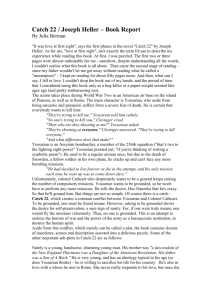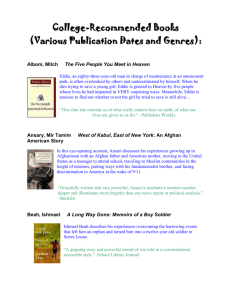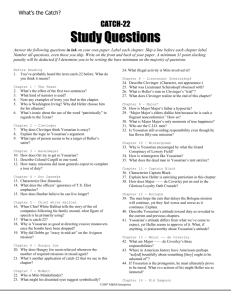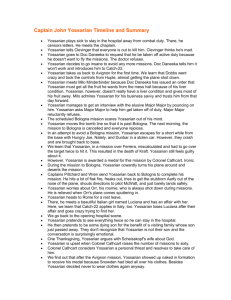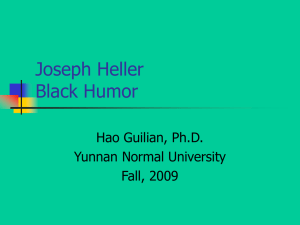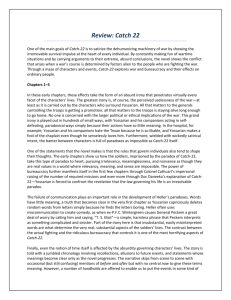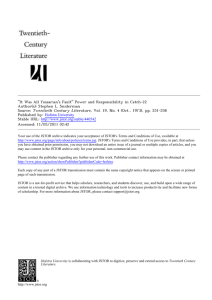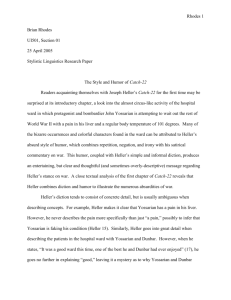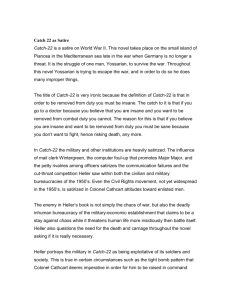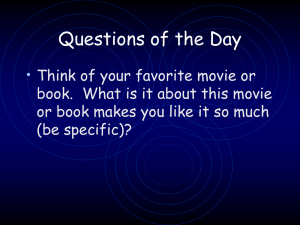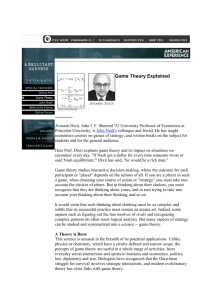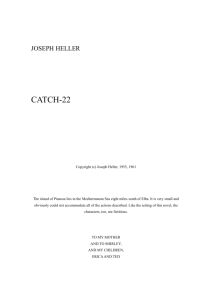“You know, he`s not a perfect hero
advertisement
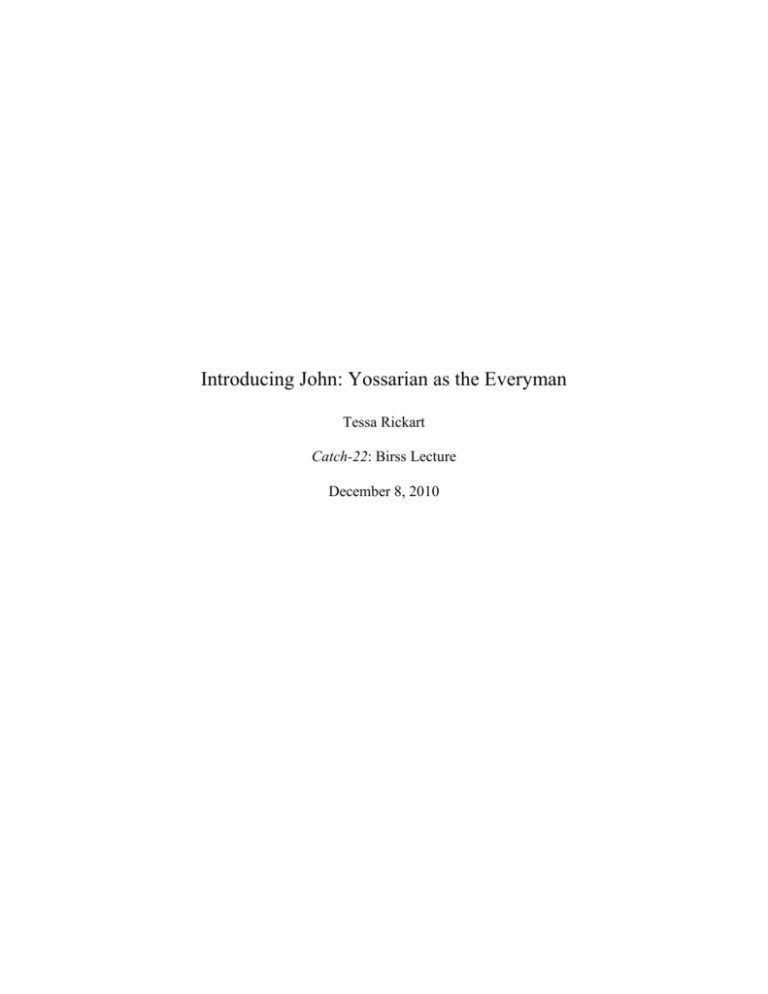
Introducing John: Yossarian as the Everyman Tessa Rickart Catch-22: Birss Lecture December 8, 2010 In a 1962 interview, Joseph Heller described the protagonist of his novel Catch-22: “You know, he’s not a perfect hero. There are certain things he does of which I don’t approve…I certainly didn’t want him to become the ideal hero. He’s human…” Yossarian’s association with the common man may not be immediately apparent, partially due to his poignantly ethnic last name, by which he is almost exclusively referred to. However, he is an ‘everyman,’ and it is through his actions and decisions that the ability to relate is first possible. Despite being the obvious main character of Catch-22, Yossarian’s weak, and often questionably unethical behaviors make it difficult to designate him as the novel’s protagonist, a role that usually requires bravery and evokes admiration. But Yossarian’s choices and motivations are characteristic of neither a coward nor a hero. Similar to most human beings, he cannot be categorized into either of these narrow divisions. Yossarian is complex and thus relatable, a point that is conspicuously made when we finally learn his first name—John. “ What the hell kind of name is Yossarian?” (78) It may initially seem odd that a blatantly American novel such as Catch-22 stars a protagonist with such an ethnically charged surname by which he is primarily identified. Colonel Cathcart comments on the uncommon name: “There were so many esses in it. It just had to be subversive. It was like the word subversive itself. It was like seditious and insidious too, and like socialist, suspicious, fascist and Communist. It was an odious, alien, distasteful name…” (210). Heller expected readers to have a similar reaction to the obscurity of the name. It certainly is foreign, and in a novel centered on an American battalion in World War II, the unfamiliar name seems even more distant. The Colonel continues his criticism of Yossarian’s name and its unAmerican roots: “It was not at all like such clean, crisp, American names…” (210). Later on, Cathcart is present when Yossarian’s stereotypically American first name is finally revealed. The late inclusion of his first name, as well as his exotic surname, is by no means accidental. In sharp contrast to the last name Yossarian, is his first name—John. The popularity of this name is not lost on the reader. As one of the most common names in the United States, John represents our own ability to empathize with the bombardier, therefore making him an ‘everyman.’ “ ‘What bombs?’ answered Yossarian” (30) Perhaps most questionable is Yossarian’s concern for his own safety, a priority that gradually becomes his chief concern: “Only a fraction of his countrymen would give up their lives to win it, and it was not his ambition to be among them” (68). His commitment to selfpreservation may seem selfish, yet it is undeniably rational. The moral ambiguity rises from his commitment as a solider to lay down his life for his country. Putting one’s self in a similar position, however, his yearning to stay alive is understandable, even if it might be considered cowardly. However, his extreme determination to live leads to some questionably unethical decisions when he jeopardizes military missions. Yossarian goes as far as sabotaging missions: “Something was terribly wrong if everything was all right and they had no excuse for turning back…Yossarian took hold of the colored wires leading into the jack box of the intercom system and tore them loose” (140). However, some of the missions themselves were unethical; one required the men to blow up a small village whose only crime was poor location. At this point, “Yossarian no longer gave a damn where his bombs fell…” (330). “Someone had to do something sometime.” (405) Eventually, Yossarian refuses to fly any more missions. The crew is faced with an everrising mission quota, and his protest is an attempt to “break the lousy chain of inherited habit that was imperiling them all” (406). This moral stance requires courage. Even Colonel Korn acknowledges this bravery when, addressing Yossarian he says, “You’re an intelligent person of great moral character who has taken a very courageous stand” (423). Of course, in Korn’s view this is a criticism. Yossarian’s valor does not escape the notice of his peers, who support and admire him, though only in secret. “During the day, they avoided him,” but at night “people kept popping up at him out of the darkness to ask him how he was doing, appealing to him for confidential information with grey, troubled faces on the basis of some morbid clandestine kinship he had not guessed existed” (402). Yossarian gives them “hope,” says Korn, admitting that whether his flying boycott is motivated by self-protection or morality, Yossarian is nonetheless benefiting the whole (421). In many ways, his refusal to fly is the bravest thing he does and deserves the title of heroic, albeit in an unconventional sense. “There were no more beautiful days.” (345) The motivations behind many of Yossarian’s supposedly weak actions (or inactions) often lay in the images of war that burden him. He is fragile; he is haunted; and he is broken. The honesty of his emotions makes them relatable; their depth makes them believable. Looking back on his past actions, Yossarian feels a responsibility for the deaths of his peers: “Yossarian killed Kraft and his crew by taking his flight of six plane in over the target a second time. Yossarian came in carefully on his second bomb run because he was brave then” (136). Yossarian comments as if he lost his courage, but he is tormented by his decisions and can’t bear to be the cause of more despair. All the deaths he has seen make a tremendous impact and plague him constantly: “At night when he was trying to sleep, Yossarian would call the roll of all the men, women, and children he had ever known who were now dead” (345). But of all the deaths and flashbacks, the most vivid are those of Snowden, “freezing to death in the rear section of the plane” as Yossarian “finished sterilizing and bandaging the wrong wound on his leg” (345). In many ways, Yossarian displays the typical symptoms of what we now call Post-Traumatic Stress Disorder, or PTSD. His frailty makes him more human. “Your conscious will never let your rest.’ ‘Yossarian laughed. ‘I wouldn’t want to live without strong misgivings.’” (452) The ultimate argument of Yossarian’s cowardice lies in final decision to desert the army. However, the more closely the situation is examined, the more Yossarian is redeemed. Having originally accepted a deal from Korn and Cathcart, a decision he admits to making “in a moment of weakness,” Yossarian is left with few options (441). Taking the deal would be an act of selfishness and cowardice. When discussing his options, Danby notes Yossarian’s courage in comparison to what his own actions would be: “Of course I’d let them send me home! But I’m such a terrible coward I couldn’t really be in your place” (447). Yossarian refuses to sacrifice his morals for the easy way out, a decision that is not always easy to make. A reader can certainly understand the dilemma with which Yossarian is struggling; by staying but refusing to fly he is sure to be court-martialed and jailed. Orr’s escape gives Yossarian new hope, and he decides to desert. This is possibly the only route left without compromising his beliefs: “Desert. Take off. I can turn my back on the whole damned mess and start running” (444). The novel does make a point of the war being mostly over, lessening the ethical dilemma. As Yossarian states, if he stayed he wouldn’t be risking his life for his country, but for Cathcart and Korn (446). Yossarian’s fight for self-preservation appeals to readers’ emotions. His choices and morals are a reflection of what our own choices and morals might be in such a situation, or at least the ones we would hope ourselves capable of. Whether Yossarian is a brave fool or a smart coward, readers are able to relate to the reality of his emotions, decisions, and values. Many of the stands he takes are incredibly courageous, qualifying him as hero, albeit an unconventional one. Some of his actions may seem unethical, but they are mostly justifiable and, more importantly, understandable. With his exotic surname, Yossarian may not initially seem like the type of character created to be identified with, but Heller knew readers would be able to connect nonetheless. When Heller finally reveals his protagonists first name—John—there is initial surprise at such a traditional moniker. However, as Heller went on to say in his interview, the decision to state Yossarian’s first name at nearly the end of the novel “just puts him right back where he belongs.” And John Yossarian belongs as a symbol of the everyday hero, and the everyday coward, with whom we can all relate and whose actions we all understand. Work Cited Heller, Joseph. The Realist Interview. Issue No. 39, Nov. 1962. Page 23. Print. 23 Nov 2010. Heller, Joseph. Catch-22. New York: Simon & Schuster, 1999.
